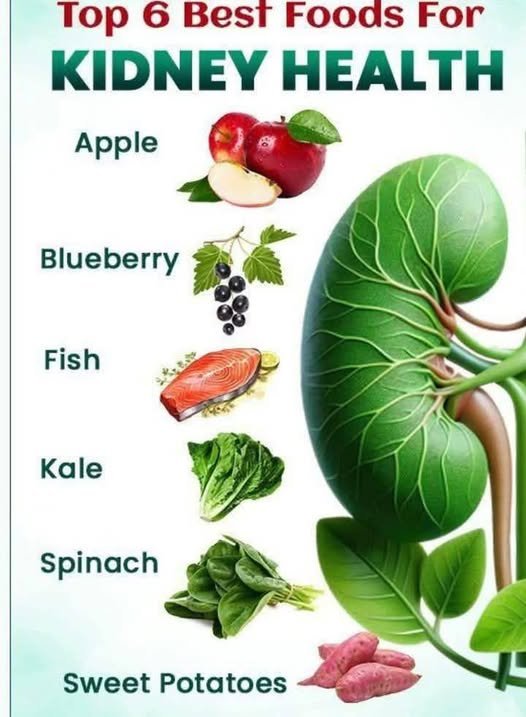Protecting kidney health through diet is crucial, especially if you’re at risk of kidney disease or managing existing conditions like diabetes or hypertension. Below are six of the best foods for kidney health, each followed by a detailed, kidney-friendly recipe. These recipes are low in sodium, phosphorus, and potassium, and focus on fresh, wholesome ingredients.
🥦 1. Cauliflower
Why it’s good for kidneys: High in fiber, vitamin C, and folate. It’s a low-potassium vegetable that helps detoxify the body.
🥣 Recipe: Cauliflower Mash
Ingredients:
-
1 medium head of cauliflower (cut into florets)
-
2 cloves garlic (optional)
-
2 tbsp olive oil
-
Salt-free herb blend or fresh herbs (like thyme or parsley)
-
Black pepper to taste (optional)
Instructions:
-
Steam the cauliflower florets (and garlic if using) for about 10–12 minutes or until very soft.
-
Drain well, then transfer to a food processor.
-
Add olive oil and herbs. Blend until smooth and creamy.
-
Season with a pinch of black pepper if desired.
-
Serve warm as a kidney-friendly alternative to mashed potatoes.
🫐 2. Blueberries
Why it’s good for kidneys: Rich in antioxidants, vitamin C, and low in sodium and phosphorus.
🥣 Recipe: Blueberry Oatmeal Parfait
Ingredients:
-
1/2 cup rolled oats (cooked in water or kidney-friendly milk substitute)
-
1/2 cup fresh blueberries
-
1/4 tsp cinnamon
-
1 tbsp chia seeds (optional)
-
2 tbsp unsweetened coconut yogurt or kidney-safe Greek yogurt alternative
Instructions:
-
Cook oats and allow to cool slightly.
-
Layer oats, yogurt, and blueberries in a glass.
-
Sprinkle with cinnamon and chia seeds.
-
Chill and serve as a breakfast or snack.
🥬 3. Cabbage
Why it’s good for kidneys: Low in potassium and packed with fiber and vitamins K and C.
🥣 Recipe: Cabbage Stir-Fry
Ingredients:
-
2 cups shredded green or red cabbage
-
1 small carrot, julienned
-
1 tbsp olive oil
-
1 clove garlic, minced
-
1 tsp low-sodium soy sauce or a kidney-friendly substitute
-
Dash of rice vinegar or lemon juice
Instructions:
-
Heat olive oil in a pan over medium heat.
-
Add garlic and stir for 30 seconds.
-
Add cabbage and carrots; stir-fry for 5–7 minutes.
-
Splash in soy sauce and vinegar, stir well.
-
Serve warm as a side dish.
🐟 4. Fatty Fish (like Salmon)
Why it’s good for kidneys: Rich in omega-3s that reduce inflammation and may lower blood pressure.
🥣 Recipe: Baked Herb-Crusted Salmon
Ingredients:
-
2 salmon fillets (4 oz each)
-
1 tbsp olive oil
-
1 tbsp fresh chopped parsley or dill
-
1 tsp lemon zest
-
1 garlic clove, minced
-
Black pepper to taste
Instructions:
-
Preheat oven to 375°F (190°C).
-
Mix olive oil, herbs, garlic, and lemon zest in a small bowl.
-
Rub mixture on salmon fillets.
-
Place fillets on a baking tray lined with parchment paper.
-
Bake for 12–15 minutes until flaky.
-
Serve with steamed low-potassium vegetables like green beans or cauliflower.
🍇 5. Red Grapes
Why it’s good for kidneys: High in antioxidants and anti-inflammatory properties.
🥣 Recipe: Red Grape & Arugula Salad
Ingredients:
-
1 cup halved red grapes
-
2 cups fresh arugula or mixed greens
-
2 tbsp chopped walnuts (optional, check phosphorus content)
-
1 tbsp olive oil
-
1 tsp balsamic vinegar
-
Fresh ground pepper to taste
Instructions:
-
In a large bowl, combine arugula, grapes, and walnuts.
-
In a small bowl, whisk olive oil and balsamic vinegar.
-
Drizzle dressing over salad and toss gently.
-
Top with fresh pepper and serve immediately.
🧄 6. Garlic
Why it’s good for kidneys: Adds flavor without sodium; helps reduce inflammation and cholesterol.
🥣 Recipe: Garlic & Lemon Roasted Green Beans
Ingredients:
-
2 cups fresh green beans, trimmed
-
2 garlic cloves, minced
-
1 tbsp olive oil
-
1 tsp lemon juice
-
Black pepper or salt-free herb blend
Instructions:
-
Preheat oven to 400°F (200°C).
-
Toss green beans with garlic, olive oil, and lemon juice.
-
Spread on a baking sheet.
-
Roast for 15–20 minutes until tender-crisp.
-
Sprinkle with herb blend or pepper and serve warm.
✅ Tips for Kidney-Friendly Cooking:
-
Avoid processed foods and canned goods high in sodium.
-
Use herbs and lemon juice for flavor instead of salt.
-
Limit high-potassium foods (like bananas, potatoes, and tomatoes) if advised by your doctor.
-
Always check phosphorus and potassium content based on your individual dietary needs.
Would you like a printable meal plan or grocery list based on these recipes?
